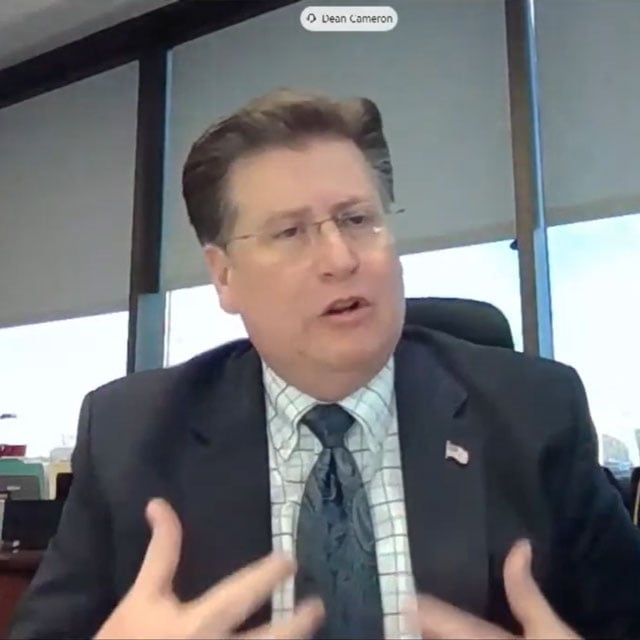What You Need to Know
- The Insurance Compact could ease uniformity rules for states that want to handle requests for increases in in-force LTCI policy premiums themselves.
- The NAIC has added a man who may be the world's tallest government official to its list of officers.
- A subgroup says LTCI issuers may need help from the IRS to offer wellness programs.
The Interstate Insurance Product Regulation Commission could give member states more freedom to handle their own reviews of long-term care insurance rate increase requests.
The commission — which calls itself the Insurance Compact — says it will continue to handle the original rate reviews for new LTCI products.
But the Insurance Compact could let states handle their own reviews when insurers want to raise rates for LTCI policies that are already in force.
The Insurance Compact’s discussion could be a sign that insurers will face more regulatory resistance to new requests for rate increases for LTCI policies that are already in force.
The Insurance Compact and LTCI
States handle regulation of the business of insurance in the United States. The Insurance Compact tries to ease some of the administrative burden associated with state regulation of a national industry, by creating what amounts to a single customer service window for insurers.
Insurers can file the paperwork needed to create products and comply with many other state requirements through the compact.
The District of Columbia and 46 states and U.S. territories belong to the compact. Some have joined the compact but opted out of using the compact to oversee LTCI products.
Dozens of insurers were selling LTCI around 2000, but inaccurate assumptions about interest rates, policy lapse rates, policyholders’ use of benefits, and the cost of benefits hurt issuers’ performance. Most have dropped out of the market, and many have sought regulator permission to raise premiums by 100% or more.
The issuers say they need the increases to keep blocks of LTCI business solvent. Many policyholders and some regulators assert that the issuers were in a much better position than the customers to assess and manage claim risk, and that the issuers, not the customers, should bear most or all of the burden for the increases..
Ray Farmer, the South Carolina insurance director, has been especially critical of some insurers’ LTCI rate increase proposals,
The compact has been handling many requests for in-force LTCI rate increases under 15% itself.
The Insurance Compact has been considering an option proposed by Mike Kreidler, Washington state’s insurance commissioner, that would let a state use the compact to regulate LTCI products and initial rates, but to handle reviews of in-force rate increases themselves.
Insurance Compact Officers
The compact has a close relationship with the National Association of Insurance Commissioners. Its leaders met in San Diego as the NAIC was convening there for an in-person meeting.
Compact members elected Maryland Commissioner Kathleen Birrane to serve as chair in 2022,, Nebraska Director Eric Dunning to serve as vice chair and West Virginia Commissioner Allan McVey to serve as treasurer.
The NAIC
The NAIC elected its own 2022 officers in San Diego.
The 2022 NAIC officers will be:
- President: Idaho Insurance Director Dean Cameron.
- President-elect: Missouri Insurance Director Chlora Lindley-Myers.
- Vice president: Connecticut Insurance Commissioner Andrew Mais.
- Secretary-treasurer: North Dakota Insurance Commissioner Jon Godfread.
In 2019, Guinness World Records declared that Godfread appears to be the world’s tallest politician. He is 6 feet 10 inches tall.
The H Committee
The NAIC designates each top-level committee with a letter, and it puts the letter after the names of a “letter committee’s” task forces, working groups and subgroups, to help distinguish between panels with similar names that may be part of different committees.
The NAIC decided in San Diego to create a top-level Innovation, Cybersecurity and Technology Committee and make that committee the H Committee.
The H Committee is the first letter committee the NAIC has created since 2004.
David Altmaier, Florida’s insurance commissioner and the current NAIC president, said the committee will work to safeguard consumers while reducing barriers to positive innovation.
“Protecting the consumer’s data and privacy and ensuring the sector’s appropriate and ethical use of that data is a critical responsibility that all our members take seriously,” Altmaier said at an NAIC meeting session in San Diego, according to a transcript of his remarks. “We look forward to engaging with each other and stakeholders on these important issues in the future.”
Long-Term Care Insurance Wellness
The NAIC’s Long-Term Care Insurance Reduced Benefit Options Subgroup presented a paper in San Diego about what turn out to be the complex regulatory barriers to a company trying to offer LTCI policyholders wellness programs.
Companies have been working to develop fall prevention programs, caregiver support programs, home modification programs and other programs aimed at keeping the insureds healthy and in their own homes as long as possible.
The subgroup identified many possible challenges related to issues such as fairness, privacy, data security and anti-rebating rules, and other concerns.
The subgroup found that still another concern is uncertainty about how to apply the official federal Internal Revenue Code definition of “qualified long-term care insurance contract” to a policy that offers wellness benefits.
A qualified LTCI policy “must satisfy a number of definitional requirements, including that such a contract must provide insurance coverage only of qualified long-term care services,” the subgroup says in the LTCI wellness paper. “It generally cannot provide a cash value. There may be adverse tax consequences for consumers if a contract provided benefits that are inconsistent with the definitional requirements.”
Two IRA interpretive letters suggest that a qualified LTCI policy can include a wellness program rider, but the guidance in the letters is directed only at the taxpayers who asked for the letters, the subgroup says.
“Insurers and policyholders could benefit from federal guidance regarding tax qualification of broad classes of QLTCI, including QLTCI combo products,” the subgroup adds.
The subgroup wants general federal guidance that would create a safe harbor, or list of wellness program features that are compatible with federal qualified LTCI requirements.
..
San Diego. (Photo: Shutterstock)







 December 17, 2021 at 04:10 PM
December 17, 2021 at 04:10 PM
















 Slideshow
Slideshow





